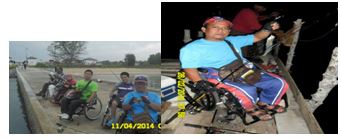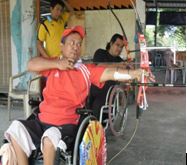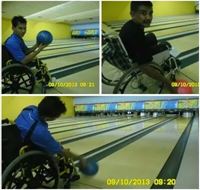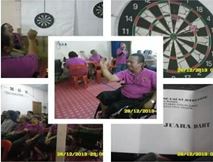Did you know that 15% of the world’s population have some form of disability? (source: World Health Organisation). Look around your community. Are you aware of their presence? Are they merely present or meaningfully included?
As an Occupational Therapist, our primary goal is to enable People with Disability (PWD) to participate in the activities of everyday life by engaging them in the occupations they want to, need to, or are expected to do, or by modifying the occupation or the environment to better support their occupational engagement.(WFOT 2012).
Although there are a variety of activities that can help PWD to socialize, express their feelings and stay healthier, many of them are still facing great boundaries to involve in leisure and recreational activities.
Article 26, Habilitation and Rehabilitation, of the United Nations Convention on the Rights of Persons with Disabilities (CRPD) calls for:
“… appropriate measures, including through peer support, to enable persons with disabilities to attain and maintain their maximum independence, full physical, mental, social and vocational ability, and full inclusion and participation in all aspects of life”.
Top 10 benefits of recreation and leisure activities for PWD:
- A sense of achievement
- Do something stimulating
- Improve health
- Have a chance to socialise with others
- Enjoy the company of friends
- Increase my energy levels
- Improve self?esteem – make you feel better about yourself
- Improve heart and lung fitness
- Be with other people who are having fun
- Spend time with friends
There are factors that need to be considered as listed below:
Identifying Interests: Getting To Know The Person
Individual’s skills, interests, physical abilities, level of socialization are the key factors that need to be considered when we want to promote PWD to actively involved and success in recreation and leisure activities. Families is a key to PWD as exploration of interests takes time, exploring and trying out different activities and settings. These needs families to spend quality time and energy together with PWD.
Community Resources: Knowing Your Community
In order to assist PWD to become involved in recreation/leisure activities, family or Occupational Therapist must aware of what opportunities or possible opportunities exist within the neighborhood and community;
- Spending time in the neighborhood; reading community newspapers, bulletin boards, and directories
- Discuss with an Occupational Therapist to involve in support group activities.
Group usually available in most of government hospital in Malaysia:
- Spinal Support Group
- Stroke Support Group
- Amputee Support Group
- Paediatric Support Group
- Cerebral Palsy Support Group
- Child Adolescent Psychiatry Group
- Adult Psychiatry
List Of Leisure And Recreational Activities; Indoor & Outdoor
Art Therapy
Painting, sketching, canvas or fabric painting, scrap booking or making jewelry from beads and drawing these can be therapeutic for PWD as art is one creative medium which is perfect to vent out one’s emotions.
Music Therapy
Singing along with the songs, clapping while the song is playing, playing a musical instrument, there are numerous ways in which music can be practiced by a PWD.
Indoor Games
Solving puzzles, playing passing the parcel with a twist wherein everyone tells the group some unknown things about himself, scrabble, making collages from newspaper/magazine cuttings, these are some fun indoor games that can be considered.
Simple Leisure Activities For Children With Disablity
- Ask them to collect at least 15 stones from the outdoors. Then get the rocks in and ask them to paint them with bright colors in different shapes and sizes.
- Provide them with a range of items like colored paper, string, buttons, mesh, paper clips etc that you can think of. Then provide them with a chart paper and glue and ask them to make a collage, with a design of their choice.
- Go through family albums and describe each person to them in great detail. This will help them understand the characteristics and qualities of each person, thereby increasing their awareness of the same.
- In a bowl, mix rice, beans and any other dry pulses and ask them to separate the same into different bowls.
- Play music tapes and ask them to clap on the beats. Ask them to join in with the tapping of the feet as well.
Outdoor Activities
Physical Activity
Swimming, dance and other aerobic are some of fun activities that can be done. Visual and tactile techniques can be helpful when giving individuals instructions on how to do something they have never done before. Facilitators/ Occupational Therapist should use the same rules and strategies they would for a person without a disability whenever they can.
Nature Activities
Scavenger hunts encourage individuals to find and identify things in nature; plants, insects, trees, birds and other wildlife. Outdoor recreational activities for the PWD include boating, fishing and hiking.
 |
Fishing Fishing is very popular within the disabled community and it is easy to see why. It provides a great opportunity to enjoy being outside in a healthy environment. |
 |
Shooting and archery Shooting and archery have always been available and there are many new sports opening up to the disabled person as new adaptive equipment is becoming available. |
 |
Bowling By nature, this leisure activities is easily adaptable. This is can be done by using adapted equipment including gutter rails, balls with handles, ramps and rails for the blind and vision impaired participants. |
 |
Dart With assistance in retrieving the darts, disabled people and people in wheelchairs can come to master darts |
Conclusion
With supports such from family, Occupational Therapist, community organization, PWD can choose to participate in a full range of community leisure and recreation activities based upon their personal interests and desires.
References
- World Federation of Occupational Therapists (WFOT)
- http://www.un.org/disabilities/documents/convention/convoptprot-e.pdf
Source Image
- Mr Zulkifflee Bin Hussin, Spinal Support Group Hospital Sultanah Aminah Johor Bahru, Johor
| Last Review | : | 28 August 2020 |
| Writer | : | Nora bt. Hamid |
| Accreditor | : | Premalatha a/p Sundram |
| Reviewer | : | Tan Foo Lan |







